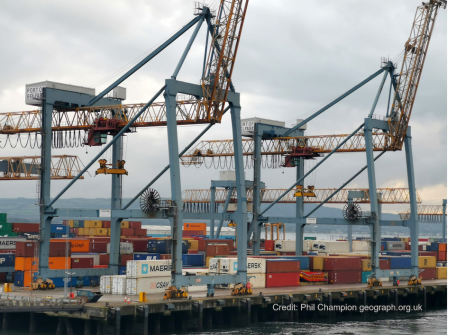Shipping Interoperability Industry Group gets underway
An important work strand within EverLoNG concerns off-loading and interoperability – what happens to the captured CO2 and how is it handled? When a ship equipped with ship-based carbon capture completes a journey and reaches a port, it needs to off-load the captured CO2. This means that the port needs to have the right infrastructure, and be connected to a CO2 transport network, to take the CO2 to geological storage sites or to utilisation.
A key challenge is to develop a common off-loading strategy between ports. To this end, EverLoNG has established a CO2 Shipping Interoperability Industry Group (CSIIG) which is evaluating ports’ CCUS readiness levels and their interest in developing a CO2 handling business.
“It’s about informing ports what they will need to develop in the future to be able to be part of the market,” says Dr Erika Palfi, Scientific Research Officer at EverLoNG partner SCCS. “We are looking through which ports are the right size in Europe to be part of the project and what incentives there are for them to be part of this.”
The different offloading options are as follows:
- Offloading at a port and transport through a pipeline to a storage injection site or utilisation site
- Offloading at an intermediate port and uploading to another ship for onward transport
- Offloading at an offshore storage injection point
- Offloading into temporary storage for onward transport to an injection site, moored storage at an injection site, or another port connected to an injection site
Consideration also needs to be given to the necessary footprint of large-scale terminals for on- and offloading. These will need to accommodate the liquid CO2 coming from the ship and condition it for utilisation, sequestration or further transport. It is generally assumed that some intermediate storage capacity will be necessary and that a storage tank size of 1-1.5 times the vessel capacity is required.
Key questions for ports include:
1. Are there local markets: proximity of storage or adjacent capture clusters?
2. Are there international markets: import of CO2 from other countries or regions for injection in local storage?
3. Is there potential to be part of a CO2 supply chain: for onward transport to other ports or for utilisation?
4. Is there an opportunity to enable decarbonisation of shipping?
In order to assess ‘port readiness’, EverLoNG is developing a tool which will help ports to assess how ready they are to be part of the CO2 transport and storage market. It will be important for large-scale deployment of carbon capture and storage (CCS) to have a network of participating ports and interoperability between ports and ships for many reasons:
- back-up storage: if one storage site is not operating then CO2 may need to go to another site possibly in another region via an alternative port
- market growth: enabling alternative storage options and avoiding lock-in to one storage site or storage monopoly
- opportunity cost: enabling ships and ports to import CO2 from capture projects to competitive storage sites in different regions
- international equity: ultimately storage sites should be accessible by all, especially those who have no storage of their own
- decarbonisation of shipping: onboard capture of CO2 means that ships may need a number of alternative ports to offload CO2 for storage or utilisation.
Among other things, within EverLoNG we are:
- developing off-loading strategies that clarify the post-capture treatment required onboard, as well as the infrastructure necessary on the port side
- evaluating the costs of off-loading, transport and storage (or utilisation) of CO2 in different CCUS chains
- formulating a roadmap towards a European off-loading network
To help, we are learning from the experience of the well-established liquified natural gas (LNG) and liquified petroleum gas (LPG) transport systems, especially with respect to process safety and liquid cargo handling procedures.
The CO2 Shipping Interoperability Group will meet again in summer 2023. If you would like to join the group, or find out more about it, please email e.palfi@ed.ac.uk. You can also read our initial report on shipping interoperability.

